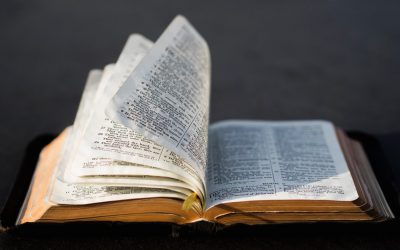John 21:1–25: The Shepherds of Jesus
In John 21:1–25, John closes his Gospel with a humbling reality: Jesus entrusts his flock to faltering shepherds. (Exposition of John 21:1–25)
John 20:19–31: The Commission of Jesus
Jesus is risen from the dead, but he will soon ascend to the Father. How, then, will the world come to believe in him? (Exposition of John 20:19–31)
John 20:1–18: The Resurrection of Jesus
After dying on the cross to finish his estate of humiliation, Jesus rises from the dead to begin his estate of exaltation. (Exposition of John 20:1–18)
John 19:28–42: The Death of Jesus
At his death, Jesus finishes his work in order to become the firstfruits of a new creation—he ends his estate of humiliation in order to begin his estate of exaltation. (Exposition of John 19:28–42)
John 19:16b–27: The Crucifixion of Jesus
To gain his heavenly kingdom, Jesus must give up every worldly good: worldly purity, worldly possessions, and worldly parent. (Exposition of John 19:16b–27)
John 19:1–16a: The Kingship of Jesus
Jesus’ royal power is not of this world. The kingdoms of this world rage against Jesus, but they cannot harm his kingship. (Exposition of John 19:1–16a)
John 18:28–40: The Trial of Jesus
The world’s curse does not diminish Jesus. Jesus can take the curse of the world because his kingship is not of the world. (Exposition of John 18:28–40)
John 18:1–27: The Betrayal of Jesus
We have learned much about Jesus from his signs and his teaching, but Jesus most fully reveals his true identity at the cross. (Exposition of John 18:1–27)
John 17:20–26: The Church of Jesus
As Jesus goes to the cross, he prays for true unity in his church: Jesus intercedes for the unity of his church in the gospel. (Exposition of John 17:20–26)
John 17:6–19: The Sanctification of Jesus
After praying for his own glorification, Jesus prays for his disciples. Here, Jesus intercedes for the sanctity of his people. (Exposition of John 17:6–19)
John 17:1–5: The Prayer of Jesus
In the High Priestly Prayer, Jesus intercedes for the full acceptance of his sacrifice. In v. 1–5, Jesus prays for himself. (Exposition of John 17:1–5)
John 16:16–33: The Victory of Jesus
Jesus promises us that neither his sorrow nor our sorrow will be in vain. At the sorrow of the cross, Jesus brings forth joy. (Exposition of John 16:16–33)
John 16:4b–15: The Treasurer of Jesus
The Holy Spirit is the Treasurer of Jesus: he exposes the bankruptcy of the world and enriches us from Christ’s treasury. (Exposition of John 16:4b–15.)
John 15:18–16:4a: The Enemies of Jesus
Because Jesus’ disciples will resemble Jesus, we must prepare for the enemies that we will face in the world. (Exposition of John 15:18–16:4a.)
John 15:1–17: The Fruit of Jesus
Despite the failure of fruitfulness in Adam and in Israel, God still demands fruit. Jesus bears fruit through his people. (Exposition of John 15:1–17.)
John 14:15–31: The Paraclete of Jesus
After his departure, Jesus is completing his mission—through new agents, by new activities, and from new accomplishments. (Exposition of John 14:15–31.)
John 14:1–14: The Way of Jesus
Jesus is much more than the prophets, priests, and kings of old. More than that, Jesus manifests the Father. (Exposition of John 14:1–14)
John 13:21–38: The Love of Jesus
Although contrary to our ideas of gaining glory through strength, Jesus glorifies himself through self-sacrificial love. (Exposition of John 13:21–38)
John 13:1–20: The Servanthood of Jesus
The suffering servanthood of Jesus connects to our own suffering: Jesus takes the form of a servant to save and to send. (Exposition of John 13:1–20)
John 12:27–50: The Glory of Jesus
What should detract from Jesus’ glory only glorifies him further. Jesus reveals his glory through the disgrace of the cross. (Exposition of John 12:27–50)
John 12:12–26: The Kingdom of Jesus
Jesus’ spiritual kingdom is invisible, hidden, and secret, confounding the world. Jesus is building a misunderstood kingdom. (Exposition of John 12:12–26)
John 11:45–12:11: The Preparation of Jesus
Both theologians of glory and theologians of the cross pursue the cross of Jesus, but for very different reasons. (Exposition of John 11:45–12:11)
John 11:1–44: The Life of Jesus
By raising Lazarus from the dead, Jesus demonstrates that he will shepherd us out of death and into his resurrection life. (Exposition of John 11:1–44)
John 10:22–42: The Works of Jesus
The works of Jesus corroborate, validate, and authenticate the word of Jesus. We need both his word and his works. (Exposition of John 10:22–42)
John 10:1–21: The Shepherding of Jesus
Jesus is the Good Shepherd who feeds us by his word and appoints undershepherds to restore us to communion with God. (Exposition of John 10:1–21)
John 9:1–41: The Sight of Jesus
Neither the firsthand knowledge of sight nor the secondhand knowledge of education can solve ignorance of the heart. (Exposition of John 9:1–41)
John 8:30–59: The Sonship of Jesus
Jesus gives a new argument to support his claims as the Messiah and to undercut his enemies: we are slaves to whomever we are sons. (Exposition of John 8:30–59)
John 7:53–8:29: The Light of Jesus
Jesus bears witness concerning his identity and mission, but ultimately, God’s light gives life and indicts darkness most clearly at the cross. (Exposition of John 7:53–8:29)
John 7:25–52: The Living Water of Jesus
As Jesus approaches the cross, his mission comes into clearer focus: the Father has sent the Son to give the Spirit to believers. (Exposition of John 7:25–52)
John 7:1–24: The Judgment of Jesus
In a world that urges, “Get yours!” Jesus reminds us that human glory-seeking is wicked and willful, but ultimately weak. (Exposition of John 7:1–24)
John 6:60–71: The Preservation of Jesus
Jesus preserves his people through a variety of applications of his word: promises, assurances, and warnings. (Exposition of John 6:60–71)
John 6:22–59: The Food of Jesus
Rather than living by feeding on bread, hungry sinners may feed on life by faith in the death and resurrection of Jesus. (Exposition John 6:22–59)
John 6:1–21: The Presence of Jesus
Although the world likes to divide winners from losers along the lines of pleasure and suffering, Jesus unfolds a different criteria for success in life. (Exposition of John 6:1–21)
John 5:19–47: The Authority of Jesus
Jesus heals on the Sabbath not to pick a fight, nor to develop a theology of the Sabbath, but to reveal the greater works that his Father has sent him to do. (Exposition of John 5:19–47)
John 5:1–18: The Sabbath Rest of Jesus
Jesus keeps the Sabbath by restoring restful work to those carrying the burden of inactivity and fruitlessness. (Exposition of John 5:1–18)
John 4:43–54: The Word of Jesus
When a royal official asks Jesus to heal his sick child, Jesus challenges the inadequacy of this father’s faith—and ours. (Exposition John 4:43–54)
John 4:27–42: The Labor of Jesus
True worship of God in spirit and truth flows out into the true work of sowing and reaping a harvest of sinners reconciled to God through Christ. (Exposition of John 4:27–42)
John 4:1–26: The Gift of Jesus
In the story of the woman at the well, Jesus reveals the full extent of God’s gift of grace to the world. (Exposition of John 4:1–26)
John 3:22–36: The Rise of Jesus
In John 3:22–26, we find one of the clearest descriptions in the whole Bible on the activity, the motivation, and the message of true Christian ministry. (Exposition of John 3:22–36)
John 3:1–21: The New Birth of Jesus
In the first place where Jesus engages in extended teaching in the Gospel of John, he explains the new birth of the Spirit. (Exposition of John 3:1–21)
John 2:13–25: The Zeal of Jesus
How does the zeal of Jesus in cleansing the temple relate to his miracle of turning water into wine? (Exposition of John 2:13–25)
John 2:1–12: The Abundance of Jesus
By turning water into wine, Jesus does more than to perform a miracle—he illustrates the overflowing abundance of his entire ministry. (Exposition of John 2:1–12)
John 1:35–51: The Call of Jesus
After John the Baptist’s proclamation (John 1:29), Jesus’ first priority is to gather a core group of disciples. (Exposition of John 1:35–51)
John 1:19–34: The Revealing of Jesus
The subservient, ministerial mission of John the Baptist heralds the coming of the one who baptizes with the Spirit (John 1:33). (Exposition of John 1:19–34)
John 1:1–18: The Identity of Jesus
The Prologue of the Gospel of John reveals the identity of Jesus as the Creator, the Redeemer, and the Mediator. (Exposition of John 1:1–18)













































